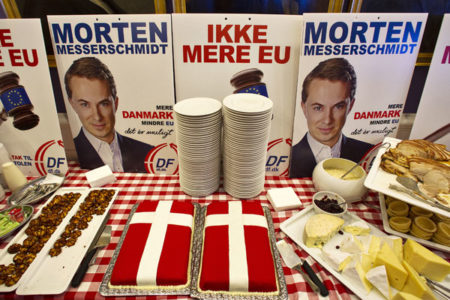Come back before you leave
Euroscepticism in Scandinavia

Freetown Christiania in Copenhagen (Source: TripAdvisor)
I noticed in recent years how Scandinavia has gained huge interest and popularity in other parts of Europe. Several factors have certainly contributed to that. For example, many of the articles people bump into while browsing social media show that Danish people are the happiest in the world. Hence, people are trying to imitate the well-famous hygge concept of cosiness by buying an overpriced book which explains to you how the Danish/Scandinavian lifestyle is done. Also, Scandinavia is often stereotypically viewed through foreign eyes as a hub for progressive measures, equality, peace, etc.
Hand in hand with this Scandinavisation, there is an example of a famous Swedish company specializing in furniture, whose founder recently died. While I sip my coffee from their trademark cups, I come to the conclusion that we, “southerners”, do not actually know a lot about the region. If you pay attention to EU-oriented media sources, there is not as much coverage of their issues as would be expected for a strong economic area. Maybe it also has to do with the fact that these countries were never forerunners of deeper European integration.
To clarify, Norway is first of all not a member of the EU at all, but has ties through the EEA and Schengen, having declined the EU membership twice in a referenda. Pro-EU urban areas were outvoted by the rural population, with farmers and concerned fishermen being strongly opposed. It would be wrong to say that ignorant and uniformed people triggered that Eurosceptic sentiment, as I was amazed by how well-informed Norwegian people are and how they closely they follow the media and current affairs. Especially with the start of the economic crisis in the late 2000s, opposition to EU membership strongly increased among the public and nowadays they are not seen as a potential EU candidate.
A couple of years ago, I took a course on Scandinavian politics at Oslo University. We had guest speakers from NGOs that opposed and supported EU membership. Despite both sides providing rational and well-constructed arguments, it seemed to me that the pro-EU activist was much shier in her discussion. In the same shy way, pro-business politicians also regret not being members of the EU, but the vox populi needs to be respected. The strongest mainstream parties would probably be mostly supportive of the membership, but are strongly opposed by their potential coalition partners from the agrarian party, as well as the far left and far right. Despite that, relations with the EU seem to be going rather well through the EEA agreement, despite occasional disputes over EU law and fishing quotas.
Their next-door neighbour Denmark joined the EC in 1973, while their territory of Greenland left in 1985, due to fisheries. The Danish citizens rejected the Maastricht Treaty in 1992, which resulted in Denmark opting-out from four elements of it. They also rejected the Euro in 2000, and, most recently, voted to leave Europol. The main political force opposing the EU is the right-wing Danish People’s Party, which had to moderate itself in the past years, also at EU Parliament level, as a couple of years ago they left Farage’s EFD group to join the less-provocative ECR. They are quite influential, finishing second in the latest parliamentary elections, and are currently supporting a minority government in Denmark. Also, there is traditional opposition from the left, but they are not so strong.

A buffet at the Danish People’s Party (Source: France 24)
Neutrality kept Sweden out of the EU for a long time, but in a post-Cold War world, they entered the EU in 1995, narrowly gaining support for that in a referendum the previous year. However, Swedish citizens rejected the Euro in 2003. Nowadays in Sweden, the main opposition to the EU comes from the Sweden Democrats, a far-right party which gained prominent support in recent years, especially during the migrant crisis. Two years ago, Sweden, which has somewhat less than 10 million people, hosted around 150 000 migrants. This proved to be a tool for strong manipulation and fake news, which, helped by certain countries whose interest is to break up the EU, helped to boost their popularity. However, recent opinion polls show that they are declining, but the danger is far from over.
It is also interesting to notice that, if you look at the most recent Eurobarometer, Danish and Swedish citizens are in the top countries when it comes to trusting the EU. They also feel that their voice counts in the EU, with Danish citizens ranking top and their Swedish counterparts third. They are majorly optimistic regarding the EU and strongly identify as EU citizens. However, the same survey shows that the citizens of Denmark and Sweden are firmly against the European economic and monetary union with the Euro as a currency.
Scandinavia itself is a very specific region, with political trends being different compared to the rest of the continent. One only needs to look at the example of the social democrats that are, despite European trends, polling significantly strongly in these countries. Also, it is home to probably the most Eurosceptic green parties, which are considerably different to their German or Austrian colleagues. The issue of Euroscepticism in Scandinavia is very complex, based around national interests and certain norms of society, and as such cannot be simplified. For instance, one could witness when traveling through Scandinavia how their sense of national pride is rather strong, with signs of something that Michael Billig would call banal nationalism, such as national flags on houses or when riding the extremely popular bicycles.
The term “pragmatic Euroscepticism of Scandinavia”, which I borrowed from professor Julie Hassing Nielsen[1], is quite an accurate one. Her article shows in-detail how Sweden and Denmark have managed to profile themselves as reliable EU members willing to compromise on certain areas, but staying uncompromising on others, such as the Euro or defence. Although this pragmatic approach brought Denmark and Sweden many benefits, at the same time it alienated them from the main circle of decisions in the EU, despite their economic power. After the discussions on how the future of EU will look like, they will basically have to accept whatever the lead countries suggest, with little room to manoeuvre.
[1] http://static-curis.ku.dk/portal/files/138515032/The_Pragmatic_Euroscepticism_of_Scandinavia.pdf
